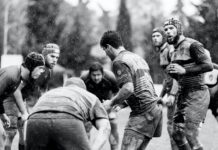Practice cannot be simply repetition or rehearsing with obvious errors. It needs to be deliberate, guided by a coach or mentor, corrected where necessary.
In his bestselling book Outliers: The Story of Success, Malcom Gladwell wrote about the average number of hours an individual needs to become an expert in their chosen field. The 10,000-hour rule of “achievement [equals] talent plus preparation” has entered popular culture as the key to success in a field. Does this apply with sales? Yes. As sales leaders, we spend time coaching, mentoring, and developing our teams to ensure we give them the best possible opportunity for success.
I was never in the military. The closest I came to be was attending the Air Cadets with some friends from high school a few times. It wasn’t the most inspirational experience, as far as I could see it involved static drill and marching in formation for hours on end. Sometime later, one of those friends graduated from the Royal Military College in our nation’s capital. I distinctly remember that cold Canberra morning as the passing out parade occurred. My memory is of a dignified ceremony, a grand spectacle, an excellent brass band and the cadets all resplendent and beautifully drilled.
How many hours of rehearsal did it take to perfect those marches? Numerous.
The lesson for salespeople is simple, to be the best, practice is critical. Each step in a sales process has multiple intricacies and ensuring your team performs to their best level at every step along the way is critical. Like military cadets learning a quick step, we need to assess our processes and examine the skills and capabilities of each individual team member to home in on development opportunities.

In Learning and Development, we use various methods of practice, rehearsal, role-playing, and discussion to effect skills and competency development, and reinforce a sales training program. Educational theory gives us significant insights into the importance of practice to excel in skills, Psychologist Anders Ericsson famously studied violin students at the Music Academy of West Berlin. By the age of 20, the top performers had practiced an average of 10,000 hours; the good violinists an average of 8,000 hours and the least able only 4,000 hours. Gladwell took this research further. And though some have claimed flaws in his methodology, the key premise is the importance of practice. Is 10,000 hours a magical number? No, but it emphasises the fact that for most of us, natural skills and abilities are developed and improved upon through hard work, practice and skilful coaching and mentoring.
Is there a nature vs nurture debate in the world of sales development and enablement? Do some people just have the “it” factor? What does a successful salesperson look like? These are all important and powerful questions. Businesses I have been part of have attempted to analyse and theorise the ideal salesperson. In reality, it is near impossible to visualise and find the so-called “perfect” salesperson. Rather, an investment in an individual’s development to enhance certain skills is a far better strategy.

Let’s review three skills that can be taught, practiced and measured; questioning skills, social selling and product knowledge.
Learning how to ask relevant and salient questions is a skill that can be taught. The ability to learn when to ask an open-ended question or to seek clarification through a closed question is one such example.
Social selling, whilst it may cause fear and trepidation for some, is a skill that a sales professional can learn. Appropriate posting, commenting and engaging is a proven method for prospecting, rapport building and client engagement.
Finally, product knowledge. Learning the features, functionality and competitive benefits of the product or service you sell is of vital importance and builds credibility and confidence when dealing with a client. An individual salesperson can practice all these skills again and again, and they all can be assessed and measured.
Though a salesperson may never achieve the 10,000 hours of practice on anyone of these, they can develop a degree of proficiency, expertise and fluency in that skill.

As sales leaders, how do we enforce practice and make it part of an ongoing professional development program?
Here are three practical scenarios you can implement immediately:
1. Understand the term, deliberate practice.
That is, when a sales professional is guided by an expert, skilled coach, or mentor, “someone with an expert eye,” as bestselling author Daniel Goleman would be inclined to say. Poor practice results in poor results. When coaching an individual in a prospecting scenario, for example, begin by asking three questions – Who are you calling? Why are you calling them? How are you going to open the conversation? Then ask the rep to practice their opening line, if it is not to an acceptable standard, have them practice again. By the time they make the call they are informed, confident and prepared. Is that a significant investment in time a for a leader? Yes. But once the mindset changes to follow this method the rep will instinctively follow these steps prior to picking up the phone.
2. Role Playing after micro-learning session.
Learn a new skill, competency or method and then rehearse. Enable your team to implement a skill immediately after it has been championed. Run the training, have the salesperson reflect on it and then immediately put it into practice. The power of practicing immediately after a new skill is learned is critical in slowing the forgetfulness curve. It also helps in the accumulation of a skillset. Proficiency is achieved in one area and then another is piled on until a full customer engagement scenario is explained, practiced and internalised.
3. Build a cohesive “we-are-all-sales” organisation.
Use real customers, other leaders within the business or members from non-sales teams to accentuate reality and to ensure that salespeople can communicate and practice with a wide variety of personality types and business roles. There is an additional benefit for other leaders within a business (think finance, ops and marketing), as this method provides greater insight into the daily experience of a salesperson’s life and builds a more cohesive “we-are-all-sales” organisation.
The motivational sales guru Grant Cardone, frequently espouses the mantra to Practice, Drill, and Rehearse. Practice cannot be simply repetition or rehearsing with obvious errors. It needs to be deliberate, guided by a coach or mentor, corrected where necessary. As we know from education if a fundamental step has not been grasped, go back to the basics and build up to that higher level of proficiency. If a member of the military learned a quick step march incorrectly, then on that Canberra morning there would have been an obvious flaw that would have stood out to the assembled crowd. We don’t want our sales people to be robotic, but we do want to give them the best possible chance to succeed in a competitive environment and to provide clients with the best possible engagement experience.
“It’s not necessarily the amount of time you spend at practice that counts; it’s what you put into the practice.” … Eric Lindros (professional ice hockey player)



































